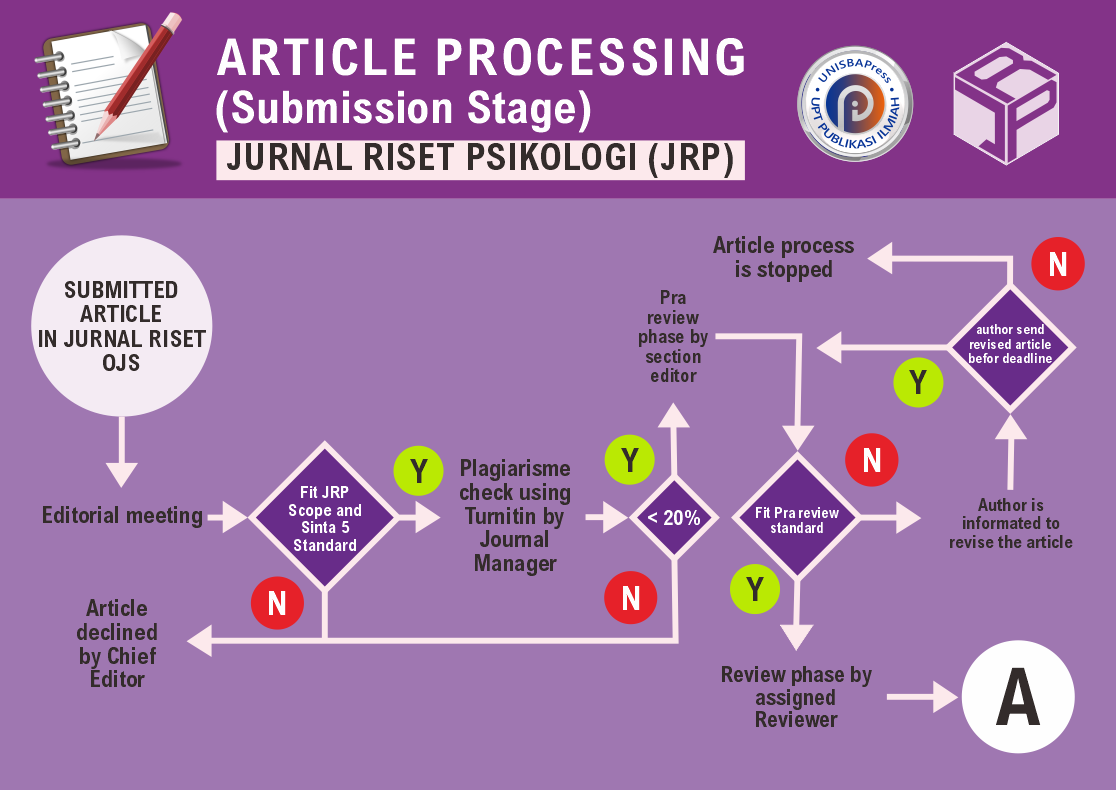Hubungan Religiusitas dan Stres pada Individu Muslim Dewasa Awal
DOI:
https://doi.org/10.29313/jrp.v2i2.1599Keywords:
Religiusitas, stres, individu muslimAbstract
Abstract. The Covid-19 pandemic has caused early adult individuals to be the highest group experiencing stress due to career uncertainty, professional life at stake, job loss, fear of infection and overestimation of risk. The subjects involved in this study were 112 male and female subjects with an age range of 18-29 years. This study uses a correlational quantitative design with data collection methods using a questionnaire with Amir's Muslim Religiosity Scale (2021) and Percieved Stress Scale. The results showed that p = 0.069 (p>0.05) and r = 0.141. That is, there is no significant negative correlation between religiosity and stress in early adult Muslim individuals. Therefore, this research hypothesis is rejected. This is due to the possibility of other factors that are more influential on the stress level of early adult individuals, such as age level, stress coping, and religious experience.
Abstrak. Masa pandemi Covid-19 menyebabkan individu dewasa awal menjadi kelompok tertinggi yang mengalami stres karena menghadapi ketidakpastian karier, kehidupan profesional pekerjaan yang dipertaruhkan, kehilangan pekerjaan, takut tertular dan perkiraan resiko yang berlebihan. Subjek yang terlibat dalam penelitian ini sebanyak 112 subjek laki-laki dan perempuan dengan rentang usia 18-29 tahun. Penelitian ini menggunakan desain kuantitatif korelasional dengan metode pengumpulan data menggunkaan kuesioner dengan skala Religiusitas Muslim milik Amir (2021) dan Percieved Stress Scale. Hasil penelitian menunjukkan bahwa p = 0,069 (p>0,05) dan r = 0,141. Artinya, tidak terdapat korelasi negatif signifikan antara religiusitas dan stres pada individu muslim dewasa awal. Oleh karena itu, hipotesis penelitian ini ditolak. Hal ini dikarenakan kemungkinan faktor lain yang lebih pengaruh pada tingkat stres individu dewasa awal, seperti tingkat usia, coping stres, dan pengalaman beragama.
References
Y. Qiu, J., Shen, B., Zhao, M., Wang, Z., Xie, B., & Xu, “A nationwide survey of psychological distres among Chinese people in the COVID-19 epidemic: implications and policy recommendations,” Gen. Psychiatry, vol. 33, pp. 1–3, 2020.
R. P. Shevlin, M., McBride, O., Murphy, J., Miller, J. G., Hartman, T. K., Levita, L., … Bentall, Anxiety, Depression, Traumatic Stress, and COVID-19 Related Anxiety in the UK General Population During the COVID-19 Pandemic. 2020. doi: https://doi.org/https://doi.org/10.31234/osf.io/hb6nq.
C. Germani, A., Buratta, L., Delvecchio, E., & Mazzeschi, “Emerging adults and covid-19: the role of individualism-collectivism on perceived risks and psychological maladjustment,” Int. J. Environ. Res. Public Health, vol. 17, pp. 2–15, 2020.
R. Cohen, S., Kamarck, T., & Mermelstein, “A global measure of perceiver stress,” J. Health Soc. Behav., vol. 24, pp. 385–396, 1983.
Musradinur, “Stres dan cara mengatasinya dalam perspektif psikologi,” J. Edukasi, vol. 2, no. 2, pp. 183–200, 2016.
A. Yudra, F. O., Fikri, & Hidayat, “Hubungan antara religiusitas dengan stres kerja pada anggota brimob polda riau,” An – Nafs J. Fak. Psikol., vol. 12, no. 1, pp. 12–21, 2018.
B. J. Hill, P. C., Pargament, K. I., Hood, R. W., McCullough, M. E., Swyers, J. P., Larson, D. B., & Zinnbauer, “Conceptualizing religion and spirituality: Points of commonality, points of departure,” J. Theory Soc. Behav., vol. 23, no. 2, pp. 192–201, 2000.
Y. Amir, “Pengembangan skala religiusitas untuk subyek muslim,” Indones. J. Psychol. Relig., vol. 1, no. 1, pp. 47–60, 2021.
M. Muslim, “Manajemen stress pada masa pandemi covid-19,” ESENSI J. Manaj. Bisnis, vol. 23, no. 2, pp. 192–201, 2020.
N. Andriani, V. Elita, and S. Rahmalia, “Hubungan Bentuk Prilaku Bullying Dengan Tingkat Stres Pada Remaja Korban Bullying,” Progr. Study Ilmu Keperawatan, pp. 426–435, 2011.













